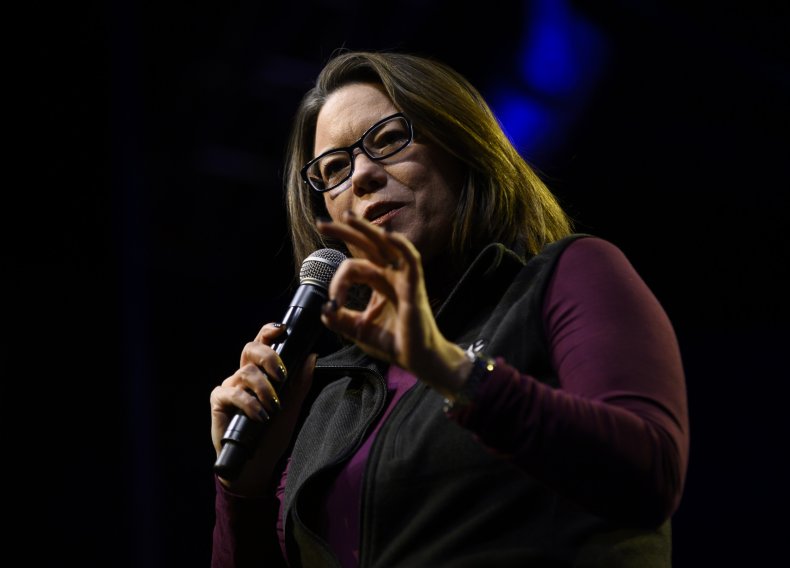Newsweek: Republicans Want to Delay the Election in This Minnesota Trump District—Voters Overwhelmingly Oppose
By: Ramsey Touchberry
10/19/2020
When Legal Marijuana Now Party candidate Adam Weeks died in September, it triggered a state law that said the election for Minnesota's 2nd Congressional District must be postponed from November until February. His death plunged the race into uncertainty, as early voters were already casting their ballots.
Rep. Angie Craig (D-Minn.) sued—and won—to keep the election as scheduled for Nov. 3.
But the move by Craig's GOP challenger, Tyler Kistner, as well as a top state Democratic official and the Legal Marijuana Now Party, to appeal the judge's ruling and try to delay the contest with a special election is overwhelmingly opposed in a bipartisan fashion, according to a new internal poll first provided to Newsweek.
The survey, conducted by Democratic polling firm Normington Petts that was commissioned by the Craig campaign, shows 72 percent of voters prefer having the election Nov. 3 while just 15 percent prefer a special election on Feb. 9. Those who prefer the election continue as scheduled include 71 percent of Republicans and 81 percent of Democrats. The poll was conducted Oct. 12-14 among 400 likely voters and has a +/- 4.9-point margin of error.
The district, located just south of Minneapolis, is one of the many seats Democrats flipped in 2018, despite President Donald Trump winning it. Trump bested Hillary Clinton by 1.2 points in 2016 while Craig beat her GOP opponent by roughly 5.5 points. Craig is one of several dozen most vulnerable House Democrats.

Democrats feel Kistner's push for a special election on Feb. 9—which would mean the district would be without representation for more than a month—is a political one aimed at securing an advantage with lower voter turnout.
Minnesota Secretary of State Steve Simon, a Democrat, said in the immediate aftermath of Weeks' death that the election would be delayed under a state law that says the death of a major party candidate in the run-up to an election triggers an automatic special election. The Legal Marijuana Now Party obtained "major party" status thanks to securing at least 5 percent of the vote during the 2018 midterms for a statewide race.
On Oct. 9, a judge ruled in Craig's favor, saying federal law trumps state law and that the contest must take place Nov. 3. Kistner appealed and a final ruling is expected sometime this week. Simon and the Legal Marijuana Now Party are also part of the lawsuit and back Kistner's push for a special election.
The Kistner campaign told Newsweek that the notion they want the contest delayed is "not really supper accurate" and that Craig is the one to blame for any confusion among voters. Kistner has said voters told him they refrained from choosing a candidate for the congressional race during early voting because they were under the impression that their vote would not be counted.
Proceeding with the election as scheduled favors the incumbent, the campaign argues, and that Kistner altered his strategy and ad spending when it was announced a special election would be held in February, including the cancellation of events and donors withholding contributions. The Kistner campaign also accused Craig of trying to use the national election to overshadow her record being put in the spotlight.
"The only person creating confusion is Angie Craig," Kistner spokesperson Billy Grant said. "There was no cause for confusion until she challenged the ruling."
The Craig campaign argues few people were even aware about the prospect for a special contest. Based on their internal poll, just 14 percent of local voters have read or heard "a great deal" about a special election.
Public polling for the congressional race is sparse, but there are indicators that Craig is poised to win.
A poll in July showed Craig up by nine points, FiveThirtyEight overwhelmingly favors Craig to win re-election, and the major election forecasters all rate the seat either "lean," "likely" or "solid" Democratic.
Craig is also dominating fundraising. The first-term Democrat has raised more than twice this cycle than Kistner has, and her cash on hand is fourfold that of her Republican challenger. However, Kistner entered the race late and has been a strong fundraising, outraising Craig in the second quarter.
The internal poll showed Craig leading Kistner 53 percent to 35 percent, while Democratic presidential nominee Joe Biden leads Trump 55 percent to 39 percent in the district.